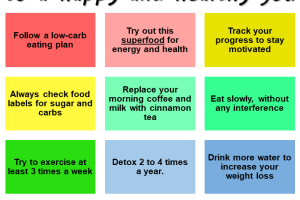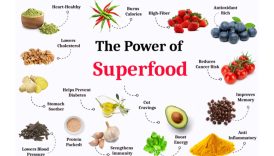The Ultimate Guide to Living a Healthy and Vibrant Life

Importance of Living a Healthy Lifestyle
In today’s fast-paced world, the significance of living a healthy lifestyle cannot be overstated. Many people often find themselves caught up in daily routines that neglect their health. Yet, embracing habits such as balanced nutrition, regular exercise, and mindfulness can transform one’s physical and mental well-being. For instance, personal experience highlights how committing to a structured routine not only improves energy levels but also enhances mood remarkably.
- The Ultimate Guide to Living a Healthy and Vibrant Life
- Importance of Living a Healthy Lifestyle
- Benefits of a Vibrant Life
- Nutrition and Diet
- Balanced Meal Planning
- Superfoods for Optimal Health
- Exercise and Fitness
- Types of Physical Activities
- Creating a Sustainable Workout Routine
- Mental Health and Wellness
- Stress Management Techniques
- Importance of Self-care Practices
- Sleep and Rest
- Understanding the Sleep Cycle
- Tips for Improving Sleep Quality
- Hydration and Water Intake
- Benefits of Staying Hydrated
- Healthy Hydration Habits
- Mindfulness and Meditation
- Practicing Mindfulness in Daily Life
- Techniques for Effective Meditation
- Social Connections and Relationships
- Building Healthy Relationships
- Importance of Social Support
- Healthy Habits for Longevity
- Incorporating Daily Wellness Practices
- Preventative Health Measures
- Professional Guidance and Resources
- Seeking Help from Healthcare Professionals
- Utilizing Wellness Resources and Tools
Benefits of a Vibrant Life
A vibrant life is one filled with enthusiasm, joy, and vitality. The advantages of adopting a healthy lifestyle extend beyond just physical appearance. Consider the following benefits:
- Increased Energy Levels: Regular physical activity leads to improved endurance.
- Enhanced Mental Clarity: Proper nutrition fuels the brain, promoting better focus.
- Stronger Immune System: A balanced diet rich in vitamins and minerals can reduce illness and boost resilience.
- Improved Mood: Regular exercise releases endorphins, helping alleviate symptoms of anxiety and depression.
Choosing to lead a vibrant and healthy life is not just a choice; it’s a commitment to oneself that pays off tenfold.
Nutrition and Diet
Balanced Meal Planning
Transitioning to a healthier lifestyle starts with balanced meal planning. It’s not just about eating right, but also about ensuring meals provide the nutritional variety necessary for optimal health. When I began my meal planning journey, I discovered how beneficial it was to prepare my meals in advance. This not only saved time but also kept my diet on track. Here are some tips for balanced meal planning:
- Incorporate all food groups: Aim for a mix of proteins, carbs, and healthy fats.
- Include colorful vegetables: Variety ensures a wide range of nutrients.
- Pre-portion meals: This helps control portion sizes and reduces unhealthy snacking.
Superfoods for Optimal Health
Superfoods are a fantastic addition to any healthy diet. These nutrient-dense foods can boost health and prevent diseases. Some of my favorites include:
- Quinoa: A complete protein packed with essential amino acids.
- Berries: Loaded with antioxidants, they promote heart health and improve brain function.
- Kale: This leafy green provides vitamins A, C, and K.
Incorporating these superfoods into your meals can elevate not just the nutrition, but also enhance the flavors and textures of your dishes. By committing to balanced meal planning and incorporating superfoods, anyone can take significant steps toward a healthier, more vibrant life.
Exercise and Fitness
Types of Physical Activities
As we move forward in our journey to better health, incorporating various types of physical activities becomes essential. Finding what works best can make exercising more enjoyable and sustainable. Personally, trying out different workouts helped me discover my passion for kickboxing, which is both intense and fun! Here are some popular types of physical activities to consider:
- Aerobic Exercises: Activities like running, cycling, or swimming boost cardiovascular health.
- Strength Training: Lifting weights or doing bodyweight exercises builds muscle and strength.
- Flexibility and Balance: Yoga and Pilates enhance flexibility while promoting relaxation.
- Outdoor Activities: Hiking and gardening not only get you moving but also connect you with nature.
Creating a Sustainable Workout Routine
Once you identify the types of exercises you enjoy, building a sustainable workout routine is the next step. Here are some tips I found helpful:
- Set Realistic Goals: Start with achievable milestones to avoid burnout.
- Schedule Workouts: Treat your workouts like appointments; consistency is key.
- Stay Flexible: Listen to your body and adjust your routine when needed.
By exploring various physical activities and creating a sustainable routine, exercise can effortlessly become an enjoyable part of daily life, contributing significantly to overall health and well-being.
Mental Health and Wellness
Stress Management Techniques
As we delve deeper into mental health and wellness, it’s crucial to address stress management techniques. In our fast-paced lives, stress can easily creep in and affect our overall well-being. I remember feeling overwhelmed during busy work weeks until I discovered effective ways to cope. Here are some stress management techniques that have worked for me:
- Deep Breathing Exercises: Taking a few moments to breathe deeply can significantly reduce anxiety.
- Mindful Meditation: Regular practice helps in calming the mind and improving focus.
- Journaling: Writing down thoughts and feelings can be a cathartic way to process emotions.
Importance of Self-care Practices
In tandem with stress management, self-care practices play a vital role in mental health. They are essential for replenishing one’s energy and keeping stress at bay. Personally, incorporating small self-care rituals, like evening baths or quiet reading time, has been transformative. Consider these self-care practices:
- Prioritize “Me Time”: Carve out personal time each week for activities you love.
- Nourish Your Body: Healthy eating habits also contribute to mental clarity.
- Connect with Loved Ones: Meaningful relationships provide emotional support.
By embracing stress management techniques along with self-care practices, one can foster a healthy mental state conducive to achieving a balanced and fulfilling life.
Sleep and Rest
Understanding the Sleep Cycle
Continuing our exploration of health and wellness, we arrive at the topic of sleep and rest—elements often overlooked in our busy lives. Understanding the sleep cycle is key to enhancing both the quantity and quality of rest. I once struggled with consistent sleep patterns until I learned that our sleep consists of multiple stages, including light sleep, deep sleep, and REM sleep, each crucial for various functions like memory consolidation and physical recovery. Generally, a complete sleep cycle lasts about 90 minutes, and adults typically experience 4-6 cycles in a night.
Tips for Improving Sleep Quality
Once you comprehend the importance of the sleep cycle, you can implement practices that help optimize your sleep quality. Here are some tips that have worked wonders for me:
- Create a Relaxing Bedtime Routine: Engage in calming activities like reading or gentle yoga before bed.
- Optimize Your Sleep Environment: Ensure your bedroom is dark, cool, and quiet to promote restful sleep.
- Limit Screen Time: Avoid screens at least an hour before bedtime to reduce blue light exposure.
By understanding your sleep cycle and applying strategies to enhance sleep quality, you’ll not only feel more energized but also improve your overall health and well-being.
Hydration and Water Intake
Benefits of Staying Hydrated
As we continue our journey towards a healthier lifestyle, we can’t overlook the critical role hydration plays in our well-being. Staying hydrated not only boosts energy levels but also impacts mood and cognitive function. I remember a time when I felt sluggish during workouts, only to realize I hadn’t been drinking enough water throughout the day! The benefits of staying hydrated are numerous:
- Improved Digestion: Water aids in breaking down food, helping the body absorb nutrients.
- Enhanced Skin Health: Proper hydration promotes elasticity and reduces dryness.
- Regulated Body Temperature: Staying hydrated helps the body maintain a stable temperature during physical activities.
Healthy Hydration Habits
To reap these benefits, it’s essential to develop healthy hydration habits. Here are some practical tips that have worked for me:
- Carry a Water Bottle: Keeping a reusable water bottle handy makes it easier to track your intake.
- Set Reminders: Use apps or alarms to remind you to drink water throughout the day.
- Infuse Water: Add fruits, herbs, or vegetables to your water for added flavor and nutrients.
By recognizing the benefits of hydration and adopting healthy drinking habits, you can significantly enhance your physical and mental performance, paving the way for a more vibrant life.
Mindfulness and Meditation
Practicing Mindfulness in Daily Life
As we delve into mindfulness and meditation, it’s important to explore how to weave these practices into our daily lives. Personally, I found that integrating mindfulness into ordinary activities transformed my perspective, allowing me to experience life more fully. Here are simple ways to practice mindfulness every day:
- Mindful Eating: Focus on the flavors, textures, and aromas of your food to enhance the eating experience.
- Mindful Walking: Pay attention to each step, the movement of your body, and the sensations of your surroundings.
- Breath Awareness: Take a few moments each day to focus solely on your breath, noticing each inhalation and exhalation.
Techniques for Effective Meditation
Effective meditation can greatly complement your mindfulness practices. It helps to quiet the mind, reduce stress, and promote clarity. After experimenting with various methods, I’ve found these techniques particularly beneficial:
- Guided Meditations: Use apps or online resources to follow along with guided sessions, making it easier to stay focused.
- Visualization: Picture a calming scene or a positive outcome, helping to ease anxious thoughts.
- Body Scan: Slowly bring awareness to different parts of your body, promoting relaxation and deep physical connection.
By incorporating mindfulness and effective meditation techniques into your routine, you can cultivate a calmer mind and a more centered approach to life—essential components for achieving overall mental wellness.
Social Connections and Relationships
Building Healthy Relationships
As we explore social connections, it’s crucial to emphasize the significance of building healthy relationships. Strong bonds with friends and family can provide immense emotional support and greatly influence our well-being. Personally, I’ve found that nurturing these relationships helps me navigate challenges more effectively. Here are some tips for building healthy relationships:
- Open Communication: Share your thoughts and feelings honestly, and encourage others to do the same.
- Show Appreciation: Regularly express gratitude to strengthen your connections.
- Spend Quality Time Together: Make time for shared activities, whether it’s a coffee date or a weekend adventure.
Importance of Social Support
The role of social support in our lives cannot be overstated. It serves as a protective buffer against stress and provides a sense of belonging. During challenging times, I’ve turned to close friends and family, and their encouragement has been invaluable. Here’s why social support matters:
- Promotes Resilience: Having a support system helps individuals bounce back from setbacks.
- Enhances Mental Health: Strong social ties contribute to lower rates of anxiety and depression.
- Encourages Healthy Habits: Friends can motivate each other to make positive lifestyle choices.
By prioritizing healthy relationships and recognizing the importance of social support, you can cultivate a robust network that enriches your life and contributes to overall happiness and well-being.
Healthy Habits for Longevity
Incorporating Daily Wellness Practices
As we synthesize our understanding of mental, social, and physical health, it’s essential to focus on healthy habits that promote longevity. I’ve learned firsthand that small daily wellness practices can create lasting changes. For instance, integrating a morning routine of stretching and hydration has significantly increased my energy levels and set a positive tone for the day. Here are some daily wellness practices to consider:
- Morning Rituals: Start each day with hydration, nutritious breakfast, and light exercise.
- Regular Movement: Incorporate short walk breaks throughout the day to keep the body active.
- Mindful Moments: Take time for deep breathing or gratitude reflections to center your mind.
Preventative Health Measures
Equally important are preventative health measures, which play a key role in ensuring a long and healthy life. Regular check-ups and screenings are vital. I recall attending a health seminar that emphasized the importance of routine exams, which can catch issues early on. Consider these preventative health measures:
- Annual Health Screenings: Schedule regular visits to your healthcare provider for check-ups and necessary screenings.
- Vaccinations: Stay up-to-date with vaccinations to protect against preventable diseases.
- Healthy Lifestyle Choices: Focus on balanced nutrition and regular exercise to reduce the risk of chronic conditions.
By incorporating daily wellness practices and engaging in preventative health measures, anyone can take significant strides toward a longer, healthier life. These efforts not only enhance well-being but also enrich life’s journey, leading to a more vibrant and fulfilling existence.
Professional Guidance and Resources
Seeking Help from Healthcare Professionals
As we conclude our comprehensive look at healthy habits for longevity, it’s crucial to emphasize the value of professional guidance. Seeking help from healthcare professionals can provide the support and expertise needed to navigate personal health journeys. I remember feeling uncertain about my nutrition choices until I consulted a registered dietitian who tailored a plan specifically for me. Here’s how to effectively engage with healthcare professionals:
- Find a Specialized Provider: Whether it’s a general practitioner, a nutritionist, or a therapist, choose someone who aligns with your health goals.
- Be Open and Honest: Share your concerns and experiences to obtain tailored advice.
- Follow Through on Recommendations: Taking their guidance seriously can lead to more effective outcomes.
Utilizing Wellness Resources and Tools
In addition to professional help, utilizing wellness resources and tools can further enhance your health journey. I’ve found that tracking my habits with mobile apps has made a world of difference in maintaining my goals. Consider these wellness resources:
- Health Apps: Use apps like MyFitnessPal or Headspace for tracking nutrition and meditation.
- Online Support Groups: Join communities that share similar health goals, providing motivation and accountability.
- Educational Websites: Explore trusted sites for articles on fitness, nutrition, and mental health strategies.
By seeking help from healthcare professionals and leveraging available wellness resources, individuals can set themselves up for success in achieving a healthier, longer life. Embracing this holistic approach will ensure that you are not only informed but empowered to make sustainable changes.





